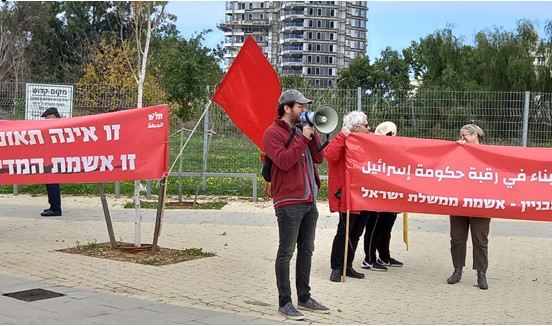Hadash and Communist Party of Israel (CPI) activists held a protest near a construction site at Bavli neighborhood in Tel Aviv on Friday, February 11, over the job-related deaths of 10 workers during the six first weeks of this year, among them seven construction workers. The protests took place under the banners “Tycoons and building contractors live in palaces while workers get coffins” and “No to construction over the bodies of workers.”

Hadash and CPI activists protest near a construction site at Bavli neighborhood in Tel Aviv against the wanton non-enforcement of safety regulations that prevails in the construction industry in Israel, Friday, February 11, 2022. The banner in Arabic and Hebrew read (at right) “The blood of construction workers is the fault of the government.” (Photo: Zo Haderech)
Two Palestinian workers fell to their deaths on Wednesday from the 40th floor of at the site of a luxury apartment complex on Harav Nissim Street in the Bavli neighborhood. The two workers, residents of occupied East Jerusalem, are Ghazi Abu Sbeitan and Ahmad Ziyad al-Sayyad.
Zo Haderech weekly said it was the third time in recent years that construction workers had been killed when mechanical scaffolding platforms collapsed. Two workers died at a site in the central city of Rosh Ha’ayin in 2018, and a worker was killed in a similar incident at a site in Tel Aviv last year. There have been no prosecutions in relation to any of those deaths.
According Hadash, government and Knesset needed to take action and legislate to ensure worker safety. “There is a distinct racist element involved in the wanton non-enforcement of safety regulations at construction sites in Israel: because the overwhelming mass of workers are either Arab, both citizens of Israel and Palestinians from the occupied territories, or foreign workers, there is no broad public outcry against the national disgrace, and the government feels itself unpressured to devise a national plan and allocate the resources necessary for its implementation,” Hadash said


